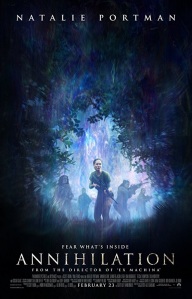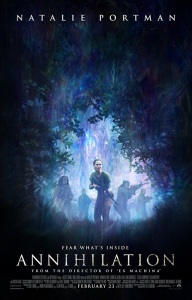
Released February 23, 2018
Rated R (Violence, Bloody Images, Language, Some Sexuality)
1 hr. 55 min.
Directed and Written by Alex Garland (28 Days Later, Ex Machina)
Cinematography by Rob Hardy (Ex Machina, Mission: Impossible – Fallout)
Music by Geoff Barrow (Ex Machina, Free Fire) and Ben Salisbury (Ex Machina, Free Fire)
Edited by Barney Pilling (An Education, Never Let Me Go)
Produced by Scott Rudin (Ex Machina, Lady Bird), Eli Bush (Captain Phillips, Steve Jobs), Andrew MacDonald (Trainspotting, Sunshine), and Allon Reich (The Last King of Scotland, Dredd)
Starring Natalie Portman (V for Vendetta, Black Swan), Benedict Wong (The Martian, Doctor Strange), Sonoya Mizuno (Ex Machina, La La Land), David Gyasi (Cloud Atlas, Interstellar), Oscar Isaac (Ex Machina, Star Wars: The Last Jedi), Jennifer Jason Leigh (Dolores Claiborne, The Hateful Eight), Gina Rodriguez (Deepwater Horizon, Jane the Virgin), Tuva Novotny (Eat Pray Love, Borg McEnroe), and Tessa Thompson (Creed, Thor: Ragnarok)
Purchase Annihilation via Amazon.
Before we dive into the review, and before you see the movie, I want to tell you this: Annihilation is the kind of movie to which you must pay very close attention as you watch it. It’s the rare sort of film that has many ambiguous and abstract elements, yet the puzzle pieces are all present, and the mystery is actually both open to interpretation and decipherable. Keep in mind, also, that Annihilation always feels off-kilter on purpose as the film brings us along on a strange journey that takes off in the suburbs and ends up in sci-fi psychedelia.
☆☆☆☆

From the opening credits, something seems a bit off, a bit unsettling, about Annihilation. We begin in space and zoom in to Earth as a meteor of some sort streams on an oddly directed path toward Earth’s surface until it collides with an old lighthouse in northern Florida on the Gulf of Mexico. Immediately, a shimmering wall begins to assemble itself around the lighthouse and slowly grow, like the sun catching a soapy bubble, blowing up.
We then cut to our protagonist, Lena (Portman), first meeting her as she teaches a class discussing molecular biology and presenting to her students a video of cancer cells, rapidly mutating. Her dialogue falls wearied from her mouth. Some of the ideas she mentions here will resurface soon. When Lena leaves the classroom, we begin to realize her backstory. One year ago, Lena’s husband, Kane (Isaac), who must assuredly be a reference to Kane from Ridley Scott’s Alien, embarked upon a top-secret special ops mission and never returned. Lena sits home alone on her sofa and weeps as the happy memories of her marriage with Kane come rushing back to her, even their disagreements about things like God and duty. Lena realizes it’s time to move on, so she decides to start with repainting her, their, bedroom. Except Kane picks that exact moment to reappear.
He’s back, and Lena feels elated, but something is wrong. Kane seems little himself, and some kind of danger comes closer when blood starts to spit from Kane’s mouth. An ambulance rushes him to the hospital but on the way is captured by the government and taken to an unknown facility in the middle of nowhere, where Lena begins to learn what is happening. The head of this facility, Dr. Ventress (Leigh), comes across as even more morose and monotonous than Lena, and Ventress explains that for three years “The Shimmer” has been slowly growing, emanating from the lighthouse and engulfing everything around it, ever throwing up its glistening wall. For three years, Dr. Ventress’s government organization has sent team after team into The Shimmer, and nothing at all has ever returned. . . until Kane.
The twelfth group is about to go in, four women led by Dr. Ventress herself. They’re not really going because they want to; they don’t. They’re not truly going because they want to study what’s in there, though they do, as they’re all scientists of some sort. They’re going out of a fateful sense of duty, or because they’re being drawn in, as if they simply must go, and that’s that. It might as well be. They’re pretty much the last resort, the only ones left to go in from Ventress’s available pool. They don’t expect to come back, but they do have a plan that they hope will give them success where others failed.
Last minute, Lena joins the team. She can’t leave the facility anyway, her husband is dying, and she tells Ventress she owes him a debt. Ventress knows what that debt is, and we first learn of it the first night the team is in The Shimmer, The Shimmer itself almost bringing a dark secret to light. In fact, The Shimmer brings to light, eventually, everyone’s true intentions and personalities, as it reflects, refracts, recreates, and mutates everything it consumes. . . creating, creating, even as mankind self-destructs. The Shimmer is gorgeous, the visual telling a wonderful tale, yet The Shimmer is horrifying at the same time, dangerous and grotesque.

☆☆☆☆
I won’t go any further into the plot. I’ve said quite enough already. I also won’t reveal much else about the themes, other than, in my estimation, Annihilation is about change, being confronted with change, the seemingly meaningless human tendency for self-destruction, the clash of the self-destructive impulse with a desire to create and improve, the unreliability and impressibility of memory, and survival. If you enjoy thoughtful, idea-heavy science-fiction, go see Annihilation. It engrossed me in its trance-like nature from scene one until the end credits rolled, after which I sat for a minute in the theater, contemplating what I’d just seen and wondering what it all means. It’s the kind of heady sci-fi that film nerds will be discussing and debating for years to come.
I do have to pause my praise for Annihilation to tell you the movie isn’t perfect. Because we see everything – well, almost everything – from Lena’s point of view, the other characters go by the wayside some. It especially would have been nice to get more solid character development for the rest of the unit that enters The Shimmer, since most of what we learn about them is told rather than shown. They’re decent enough characters, we just don’t know enough about them, and Garland asks us to care about them, especially in a few specific scenes. Also, I implied above that some of the dialogue is wooden and/or monotonous, and even though Garland makes it feel purposeful eventually (and I know he can write crisp dialogue), it still took me out of the movie more than once, as did some superfluous exposition. Maybe Garland thought we as audience members needed extra exposition, but I disliked it. Additionally, the characters do behave from time to time as if they’re in a horror flick; Garland adheres to a few sci-fi thriller tropes, which clash with Annihilation‘s fresher aspects; and the pacing and structure stumbles some in the first few minutes.
Despite my negatives, however, I love this movie for its themes; the thought-provoking parts of its story; its open-ended but not indecipherable ending; amazing visuals that add to and help establish the film’s tone; excellent performances that help maintain the tone, even though I didn’t always care for the style of performances; and a superb, eerie, off-putting score that kept me in the mood, with orchestral pieces and synths and an occasional acoustic guitar riff juxtaposed on top, carrying an important theme. The cinematography, editing, and sound design are also superb.
See Annihilation in theaters if you can, the best one you can find. A big screen and loud, clear sound will immerse you in Annihilation much better than most home systems can.
I’m going to give Annihilation an 85%.
If you have enjoyed other recent sci-fi with similarly lofty themes, such as Garland’s last film, his directorial debut, the intriguing Ex Machina, or Arrival, or Blade Runner 2049, I think you’ll appreciate Annihilation. If, on the other hand, you haven’t enjoyed those kinds of movies, I will have to say Annihilation may not be for you, because it’s not even as straightforward as those three flicks, though I still think you should check it out, because Garland has made here his most unique and original film yet.
P.S.: For fans of the novel by Jeff VanderMeer, a small warning: Garland uses Annihilation the novel only as an inspiration. Annihilation the movie is as much, or as little, a translation of Annihilation the book as Blade Runner is of Do Androids Dream of Electric Sheep. Garland said in a talk at Google that this movie is really an adaptation of the book’s atmosphere, with total blessing from VanderMeer.


I really like this movie as well. Good review.
LikeLiked by 1 person
Thanks for reading!
LikeLiked by 1 person
Excellent review, sir. Annihilation and Game Night are on my list to see next in theatres.
LikeLiked by 1 person
Another great review. I absolutely loved this flick. Everything was excellently done, except for some bits of dialogue like you mentioned. I really liked that it had me thinking about it afterwards. The book’s really good too!
LikeLiked by 1 person
Thanks! I’d like to read the book. It’s my favorite film of the year so far.
LikeLiked by 1 person
Keep in mind that the film’s very different from the book. The only similarity between them is the atmosphere. It’s a very niche book, but if you liked the film, chances are high you’ll like the book too.
LikeLike